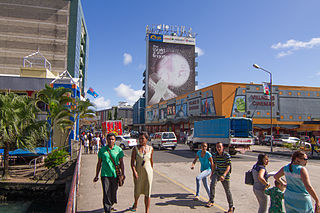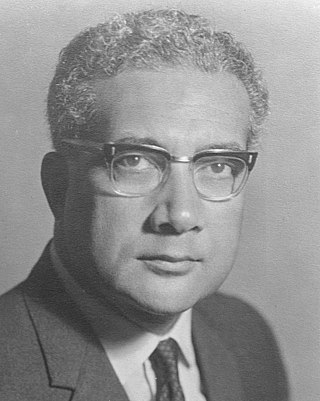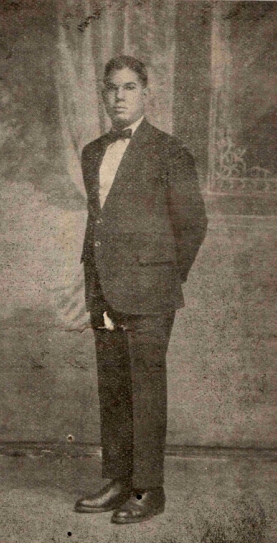
Fiji, officially the Republic of Fiji, is an island country in Melanesia, part of Oceania in the South Pacific Ocean. It lies about 1,100 nautical miles north-northeast of New Zealand. Fiji consists of an archipelago of more than 330 islands—of which about 110 are permanently inhabited—and more than 500 islets, amounting to a total land area of about 18,300 square kilometres (7,100 sq mi). The most outlying island group is Ono-i-Lau. About 87% of the total population of 924,610 live on the two major islands, Viti Levu and Vanua Levu. About three-quarters of Fijians live on Viti Levu's coasts, either in the capital city of Suva, or in smaller urban centres such as Nadi or Lautoka. The interior of Viti Levu is sparsely inhabited because of its terrain.

Suva is the capital and largest city of Fiji. It is the home of the country's largest metropolitan area and serves as its major port. The city is located on the southeast coast of the island of Viti Levu, in Rewa Province, Central Division.

Fijian is an Austronesian language of the Malayo-Polynesian family spoken by some 350,000–450,000 ethnic Fijians as a native language. The 2013 Constitution established Fijian as an official language of Fiji, along with English and Fiji Hindi and there is discussion about establishing it as the "national language". Fijian is a VOS language.

RatuSir Kamisese Mara, was a Fijian politician, who served as Chief Minister from 1967 to 1970, when Fiji gained its independence from the United Kingdom, and, apart from one brief interruption in 1987, the first Prime Minister from 1970 to 1992. He subsequently served as president from 1993 to 2000.

Articles about people, places, things, and concepts related to or originating from Fiji, include:
Ratu is an Austronesian title used by male Fijians of chiefly rank. An equivalent title, adi, is used by females of chiefly rank. In the Malay language, the title ratu is also the traditional honorific title to refer to the ruling king or queen in Javanese culture. Thus in Java, a royal palace is called "keraton", constructed from the circumfix ke- -an and Ratu, to describe the residence of the ratu.
Ratu Joni Madraiwiwi, Lord Madraiwiwi Tangatatonga was a prominent Fijian lawyer, legal scholar, jurist, and politician. He served as vice-president, and also acting president, of Fiji, and Chief Justice of Nauru.
Naming conventions in Fiji differ greatly, both between and within ethnic groups in Fiji. Indigenous Fijians have a set of cultural practices which today are more loosely followed, and to some extent blended with elements of European culture with regard to names. In the Indian community, traditional Indian naming practices co-exist with influence from the Fijian and European cultures.
The University of Fiji is a university based in Saweni, Lautoka, Fiji. It was established in December 2004 under academic leadership of the Fiji Institute of Applied Studies and financial sponsorship of the Arya Pratinidhi Sabha of Fiji, a Hindu religious organization dedicated to education." On 14 February 2016, the Native Lands Trust Board (NLTB) signed a 99-year lease with the university for the 5-hectare property, for which the university paid F$100,000. The university agreed in return to provide two scholarships annually for the children of landowners.

The "Blue Ribbon campaign" was the name for the campaign promoting support for the controversial legislation introduced by the Fijian Government in 2005 to establish a Reconciliation and Unity Commission. The name specifically comes from the blue ribbons promoted by the ruling United Fiji Party as a sign of support for the bill. This campaign had the strong support of Prime Minister Laisenia Qarase, Attorney General Qoriniasi Bale, and other members of the ruling coalition and was warmly welcomed by imprisoned coup instigator George Speight. The proposed Commission was intended to have the power to grant compensation to victims, and amnesty to perpetrators, of the coup d'état which deposed the elected government in May 2000.
Fiji Week celebrations commenced on 7 October 2005, and culminated with Fiji Day on 10 October, the 35th anniversary of Fiji's independence from British colonial rule. The official program focused on forgiveness and unity. It culminated with a day of prayer and fasting on Fiji Day. Schools, towns, and villages featured religious and cultural programs, with major celebrations Suva, Lautoka, and Labasa. The festivities were organized by the Ministry of National Reconciliation and Unity, with the assistance of the Ministry of Home Affairs and Immigration.

The tension between Fiji's government and military forces, which had been simmering for more than two years, appeared to escalate in late December 2005. Tension between the government and the military had been simmering throughout the year, with Commodore Bainimarama and other military officers making strongly worded public statements opposing certain government policies, including the early release from prison of persons implicated in the Fiji coup of 2000, and the government's promotion of controversial legislation to establish a Commission with the power to grant amnesty to perpetrators of the coup.

The crisis that saw a virtual breakdown in relations between Fiji's government and military forces in late 2005 and early 2006, generated fears of civil unrest and even a military coup. The dismissing of Lieutenant Colonel Jone Baledrokadroka, the Acting Land Force Commander, for alleged insubordination on 12 January 2006 was coupled with unusual deployments of troops and naval vessels. Both before and after it was resolved on 16 January with a truce brokered by Acting President Ratu Joni Madraiwiwi, the crisis generated a great deal of comment.

Elections to the offices of President and Vice-President of Fiji took place on 8 March 2006, when the Great Council of Chiefs met as an electoral college at the Tradewinds Convention Centre in Lami. The Great Council re-elected President Ratu Josefa Iloilo and Vice-President Ratu Joni Madraiwiwi to another five-year term.

Pt. Vishnu Deo OBE was the first Fiji born and bred leader of the Indo-Fijians. From his initial election to the Legislative Council in 1929 to his retirement in 1959, he remained the most powerful Indo-Fijians political leader in Fiji. He was a staunch supporter of Arya Samaj in Fiji and also the editor of the first successful Hindi-language newspaper to be published in Fiji.
This is a synopsis of organisations formed by Indians in Fiji. When they became free from the bondage of indenture and were able to organise themselves, they founded numerous organizations to seek social and political justice. These organisations promoted the teaching of Indian languages and religious practices and also to help others in time of need. Some of the successful organisations are listed below in the order in which they were established. Some, such as the National Federation Party, are no longer exclusively Indian, but are still predominantly so.

Fiji has three official languages under the 1997 constitution : English, Fijian and Fiji Hindi. The Fijian language is spoken as the first language by most indigenous Fijians who make up around 54% of the population.
Indo-Fijians, also known as Indian Fijians, are Fijian citizens of Indian descent, and include people who trace their ancestry to various regions of India and the Indian subcontinent. Although Indo-Fijians constituted a majority of Fiji's population from 1956 through the late 1980s, discrimination and the resulting brain drain resulted in them numbering 313,798 (37.6%) out of a total of 827,900 people living in Fiji as of 2007.

Verata is a tikina in Fiji's Tailevu Province. It is made up of several sub-districts or Tikina makawa, namely: Verata, Namalata, Tai, Vugalei, and Taivugalei.








